Global Freelance Platform Market is estimated to be worth USD 4.1 Billion in 2022 and is projected to grow at a CAGR of 15.4% between 2023 to 2032. The study has considered the base year as 2022, which estimates the market size of market and the forecast period is 2023 to 2032. The report analyzes and forecasts the market size, in terms of value (USD Billion), for the market. The report segments the market and forecasts it by component, by application, by end user and region/country.
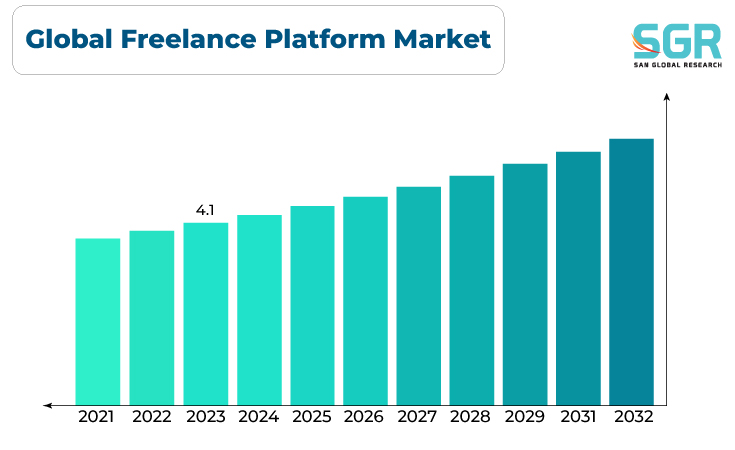
The global freelance platform market has witnessed a significant surge in recent years, reflecting a transformative shift in the nature of work and employment. These platforms serve as digital marketplaces connecting businesses or individuals seeking freelance services with a diverse pool of freelancers offering a wide array of skills and expertise. This market has experienced rapid growth driven by several factors, including the rise of the gig economy, technological advancements enabling remote work, and the increasing preference for flexible work arrangements among both employers and workers. Freelance platforms offer a plethora of services spanning various industries, including graphic design, software development, content creation, marketing, and more. They provide opportunities for freelancers to showcase their talents, access a global client base, and establish independent careers while enabling businesses to find specialized talent on-demand and scale their workforce according to project needs. The market's expansion is propelled by the growing acceptance and utilization of freelance platforms by businesses of all sizes, from startups to multinational corporations, seeking agile and cost-effective solutions. As the freelance economy continues to flourish, these platforms are expected to play an increasingly pivotal role in reshaping the future of work, providing opportunities for skilled individuals worldwide to access work opportunities and fostering a more dynamic and flexible labor market.
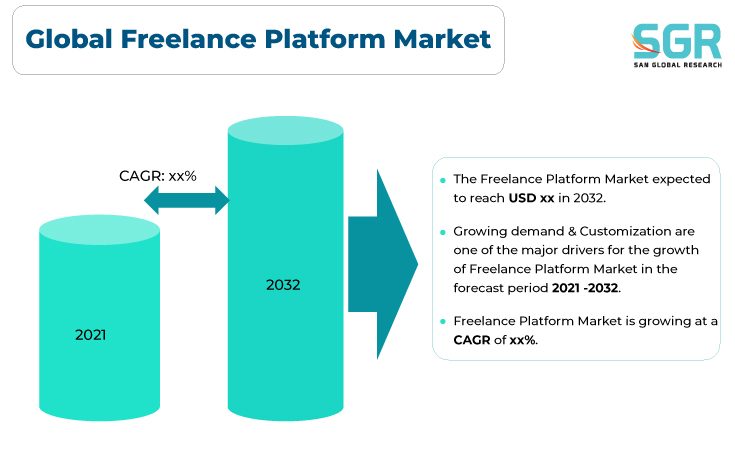
Region Wise Comparison:
North America, particularly the United States and Canada, had a robust presence in the freelance platform market. These countries were home to some of the leading freelance platforms and witnessed significant usage by both businesses and freelancers. The gig economy in North America had been thriving, with freelancers offering services across a wide spectrum of industries, including technology, marketing, design, and more. The region's advanced digital infrastructure and a culture promoting entrepreneurialism contributed to the growth of freelance platforms.
European countries, including the United Kingdom, Germany, France, and others, also exhibited a strong foothold in the freelance platform market. Freelance platforms were gaining traction, catering to a diverse range of freelance professionals seeking remote work opportunities. European businesses increasingly utilized these platforms to access skilled freelancers for various projects, contributing to the gig economy's expansion in the region.
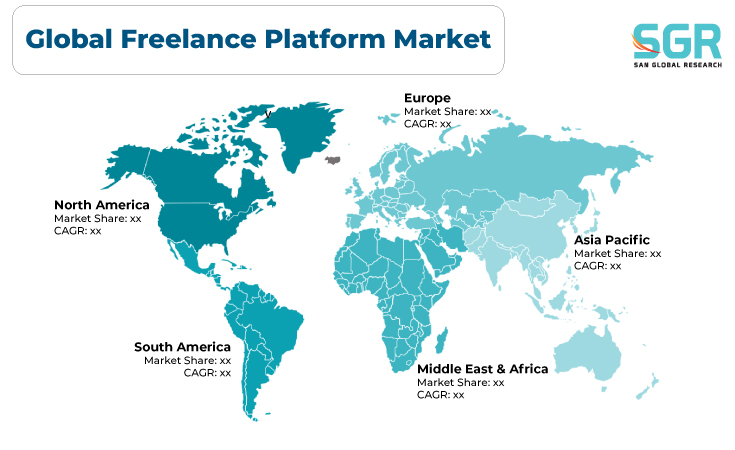
The Asia-Pacific region, encompassing countries like India, China, Japan, and Australia, was experiencing a burgeoning freelance platform market. Freelance platforms were gaining popularity as a means for individuals to access work opportunities and for businesses to tap into a global talent pool. The adoption of freelance platforms was rising, albeit at different rates across various countries due to differences in technological infrastructure and workforce trends.
Latin America, the Middle East, and Africa were also witnessing the emergence and growth of freelance platforms, although the extent of their presence varied across these regions. While the freelance economy was evolving, factors such as technological access, internet penetration, and cultural inclinations toward freelance work influenced the market's development at different paces.
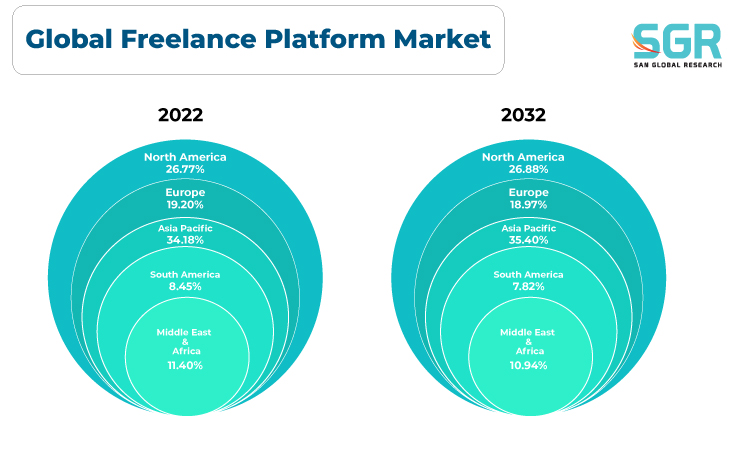
Segmentation:
- The Global Freelance Platform Market is segmented by component, by application, by end user and region/country.
By Component:
- Based on the Component, the Global Freelance Platform Market is bifurcated into Platform & Services – where the Platform is dominating and ahead in terms of share.
- In the global freelance platform market, diverse platform types cater to the needs of both freelancers and businesses seeking specialized services and talent. Generalist platforms, such as Upwork and Freelancer.com, serve as expansive marketplaces connecting freelancers offering a wide range of skills—ranging from writing and graphic design to programming and marketing—with clients seeking these services. Niche-specific platforms, like Total for elite software developers or 99designs for graphic design projects, focus on specialized skill sets, providing a curated pool of high-quality professionals.
By End Users:
- Based on the End Users, the Global Freelance Platform Market is bifurcated into Employers & Freelancers – where Employers is dominating and ahead in terms of share.
By Application:
- Based on the Application, the Global Freelance Platform Market is bifurcated into Project Management, Sales & Marketing, IT, Web & Graphic Design and Others – where the Project Management is dominating and ahead of others in terms of share.
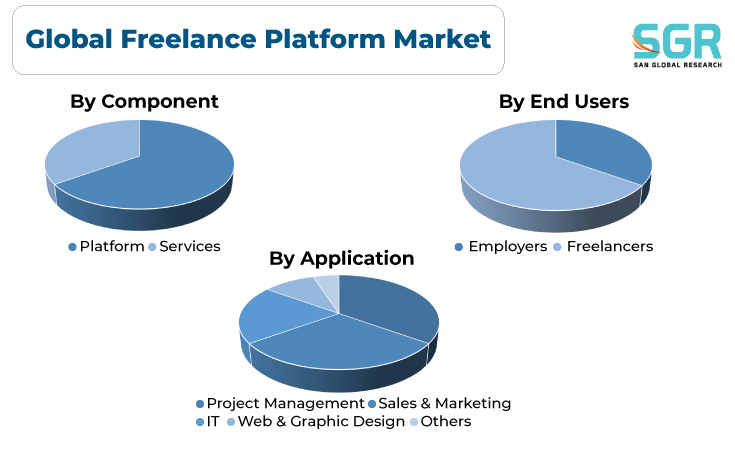
On the basis of region
- North America
- Europe
- Asia Pacific
- South America and
- Middle East and Africa
In 2022, North America is anticipated to dominate the Global Freelance Platform Market with market revenue of XX USD Million with a registered CAGR of XX%.
Key Players:
The key market players operating in the Global Freelance Platform Market include
- UPWORK
- FEVERR
- TOPTAL
- PEOPLE PER HOUR
- FREELANCER
- 99 DESIGNS
- WORKGENIUS
- PARO
- CONTENTLY
- GIGSTER LLC
Drivers:
Growing sector across the globe
The global freelance platform market is driven by a convergence of factors reshaping the nature of work and employment worldwide. A primary driver is the evolving workforce landscape, marked by an increasing preference for flexible work arrangements among both businesses and professionals. Freelance platforms offer an avenue for skilled individuals to access a diverse range of work opportunities globally, allowing them to showcase their talents and expertise while enjoying the autonomy of remote work. Additionally, businesses are drawn to these platforms due to their agility in accessing specialized talent on-demand, enabling cost-effective solutions for project-based work without the overhead of traditional employment. The rapid advancement of digital technologies, particularly the rise of mobile connectivity and cloud-based tools, has facilitated the growth of freelance platforms, enabling seamless connections between businesses and freelancers across borders. Moreover, the ongoing impact of global events, such as the COVID-19 pandemic, has accelerated the adoption of remote work and the utilization of freelance platforms as businesses seek agile solutions to adapt to changing economic landscapes. As these drivers continue to converge, the global freelance platform market is poised for continual growth, revolutionizing the traditional employment paradigm and empowering a more flexible and interconnected global workforce.
Opportunity:
Evolving Market
The global freelance platform market presents an array of opportunities that stem from the evolving nature of work, technological advancements, and shifting workforce preferences. One significant opportunity lies in the increasing acceptance of remote work and flexible arrangements, as freelance platforms offer a gateway for individuals worldwide to access a broad spectrum of work opportunities regardless of geographic constraints. For businesses, these platforms provide access to a global pool of specialized talent, enabling them to swiftly scale their workforce according to project demands and gain access to diverse skill sets. Moreover, the ongoing evolution of digital tools and technologies opens doors for innovative solutions within the freelance economy, fostering new platform features, enhanced user experiences, and streamlined processes. As businesses and individuals embrace the gig economy, niche markets and specialized services are emerging on freelance platforms, catering to unique needs across various industries. Furthermore, the rise of AI and automation presents an opportunity for freelance platforms to integrate smarter matching algorithms, predictive analytics, and improved project management tools, further enhancing efficiency and value for both freelancers and clients.


 Description
Description
 Gera Imperium Rise,
Gera Imperium Rise,  +91 9209275355
+91 9209275355


